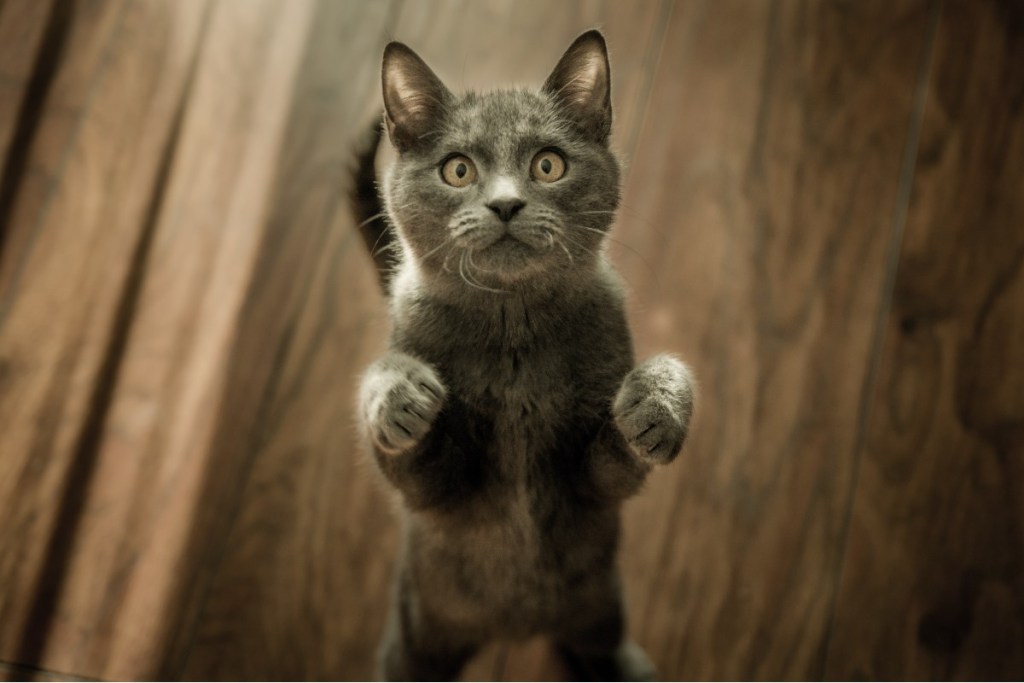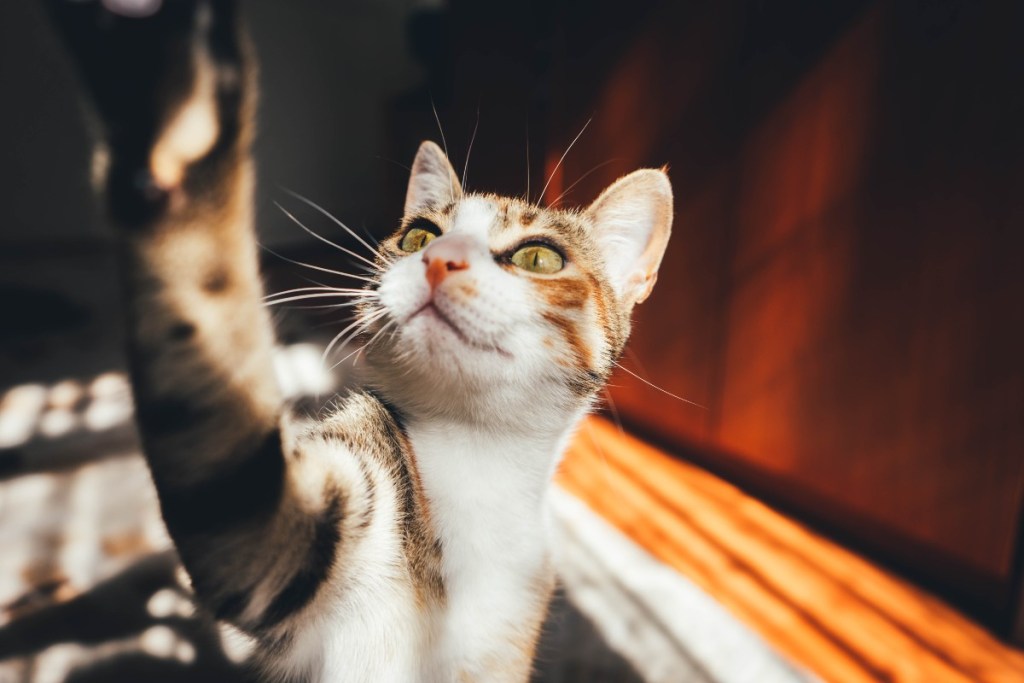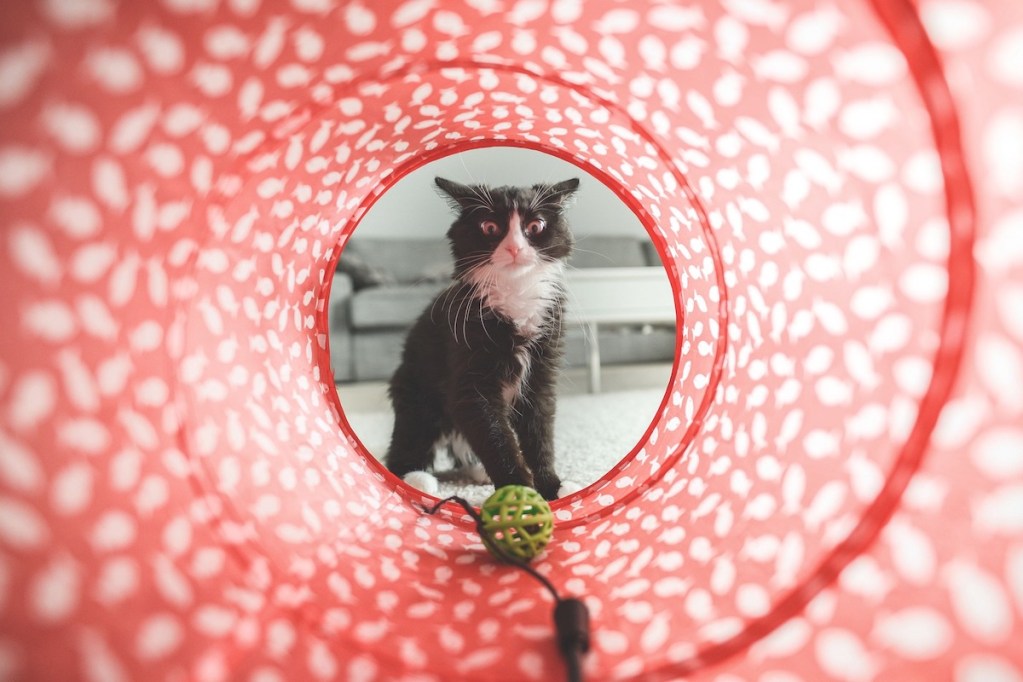With their luxurious coats, adorable faces, and bright, inquisitive eyes, our feline friends are beloved members of the family. But sometimes these clever kitties display certain behavioral traits that simply don’t pass muster in polite society. They watch us while we sleep, dart between our legs as we walk, and even topple holiday trees. Even more disturbing, a 2021 study indicates that domestic cats may kill small animals because they enjoy it, not because their dietary needs are unmet.
Is your cat a psychopath? Psychologists from Liverpool University and Liverpool John Moores University have created a comprehensive quiz for cat parents. We’ll delve into several reasons why you may suspect your frisky feline is a psychopath, and then we’ll figure out whether this quiz can help you figure it out for good.

Why people may ask: Is your cat a psychopath?
To some extent, comparing cats to psychopaths is often tongue-in-cheek. They can be different from our canine and human family members and friends. Cats can be more aloof, but they aren’t always. They’re natural-born predators, and evolution hasn’t completely banished instincts such as hunting and killing small birds. (They’re technically considered an invasive species and combine to kill billions of birds each year.)
Cartoons often portray cats as snotty creatures who think they’re oh-so-much better than dogs and humans. Some crave alone time, though others are super-cuddly.
The psychologists behind the study curated a list of 46 traits that may indicate cats are psychopaths and developed them into questions for the questionnaire. Traits include:
- Tormenting prey instead of eating it right away
- Vocalizing loudly, such as by meowing or yowling, for no apparent reason
- Being very excitable, such as going into “overdrive” and “becoming uncoordinated”
- Dominating neighborhood cats, such as by picking fights
- Dominating pet parents, such as by chasing or attacking them
Does that sound like your cat? Come to think of it, does that sound like a pint-sized psychopath? Read on to learn more about how the study can help you figure out if your little sofa lion is psychotic.
How the quiz works
Psychologists started with 2,000 cat parents. They had them fill out the 46-question quiz called the CAT-Tri+. For each trait, it asked them to rate, on a scale of 1 to 5, whether it describes their cat:
- 1: Not at all
- 2: Slightly well
- 3: Moderately well
- 4: Very well
- 5: Extremely well
Respondents could also select “not applicable.” Once finished, the pet parents tallied up their scores. Psychologists included a key at the bottom, so the participating pet parents could see where their cat stacked up in five categories: bold, disinhibited, mean, pet-unfriendly, and human-unfriendly.

Do high scores mean your cat is a psychopath?
If you looked at some of the above prompts and thought to yourself, “They sound exactly like my cat,” you might be concerned. Is the test valid? The researchers think so, but also don’t believe cat parents need to call the kitty cops on their feline friend.
“We believe that like any other personality trait, psychopathy is on a continuum, where some cats will score more highly than others,” said lead researcher Rebecca Evans, according to The Daily Mail.
What’s more, it’s important not to project human expectations onto cats – our evolutionary journeys have been different.
“It is likely that all cats have an element of psychopathy as it would have once been helpful for their ancestors in terms of acquiring resources, for example, food, territory, and mating opportunities,” Evans reportedly said.
She hopes that kitty caregivers and vets use the information from the quiz to enhance relationships between humans and their pets. She also thinks it can guide pet parents and vets to teach cats to be the best versions of themselves.
“A cat that has a high score on the boldness scale may benefit from large cat trees and tall scratching posts, as the Cat-Tri+ items suggest that a bold cat enjoys exploring and climbing,” Evans reportedly added.

Cats will be cats
Is your cat psychotic? Maybe, at least by human standards. The prompts in this questionnaire enable pet parents to rate their cat. These prompts include whether or not the cat picks fights with other neighborhood felines and dangles prey before eating it. The higher the score, the more likely the cat fits the “psychopath” bill.
Researchers think this quiz can provide insight into a cat’s behavior, but concede that evolution plays a role. Hunting and protecting their turf may have been survival tactics for your kitty’s ancestors. The quiz’s greatest benefit may be that it can give you insights into why your cat acts a certain way, as well as ways to keep them happy, such as high cat trees.
Editors' Recommendations
- Wondering why cats chirp? Fascinating reasons why your cat chirps at birds (and you)
- How to cat-proof your balcony before the unthinkable happens
- There’s a totally normal reason cats throw up after eating grass – here’s why
- When can kittens leave their mom? Don’t separate them too early
- When do kittens’ eyes change colors? The answer is so cool – here’s what to know




